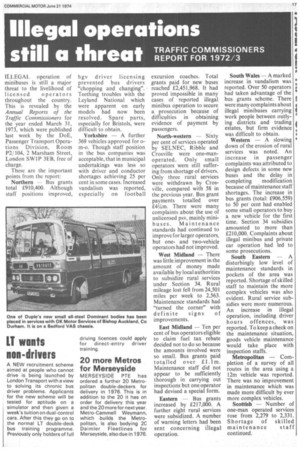illegal operations still a threat
Page 19

If you've noticed an error in this article please click here to report it so we can fix it.
TRAFFIC COMMISSIONERS REPORT FOR 1972/3
ILLEGAL operation of minibuses is still a major threat to the livelihood of licensed operators throughout the country. This is revealed by the Annual Reports of the Traffic Commissioners for the year ended March 31, 1973, which were published last week by the DoE, Passenger Transport Operations Division, Room P2/104, 2 Marsham Street, London SW IP 3EB, free of charge.
These are the important points from the report: Northern — Bus grants total £910,400. Although staff positions improved, hgv driver licensing prevented bus drivers "chopping and changing". Teething troubles with the Leyland National which were apparent on early models had now been resolved. Spare parts, especially for Bristols, were difficult to obtain.
Yorkshire — A further 369 vehicles approved for om-o. Though staff position in the bus companies was acceptable, that in municipal undertakings was less so with driver and conductor shortages achieving 25 per cent in some cases. Increased vandalism was reported, especially on football excursion coaches. Total grants paid for new buses reached £2,451,968. It had proved impossible in many cases of reported illegal minibus operation to secure a prosecution because of difficulties in obtaining evidence of payment by passengers.
North-western — Sixty per cent of services operated by SELNEC, Ribble and Crosville were one-manoperated. Only small operators were still suffering from shortage of drivers. Only three rural services were withdrawn by Cros\Julie, compared with 58 in the previous year. Bus grant payments totalled over £4/4m. There were many complaints about the use of unlicensed psv, mainly minibuses. Maintenance standards had continued to improve for larger operators, but oneand two-vehicle operators had not improved.
West Midland — There was little improvement in the amount of money made available by local authorities to subsidize rural services under Section 34. Rural mileage lost fell from 24,501 miles per week to 2,563. Maintenance standards had "turned the corner" with definite signs of improvements.
East Midland -Ten per cent of bus operators eligible to claim fuel tax rebate decided not to do so because the amounts involved were so small. Bus grants paid totalled over £1.1m. Maintenance staff did not appear to be sufficiently thorough in carrying out inspections but one operator had devised a special form.
Eastern Bus grants increased by £217,000. A further eight rural services were subsidized. A number of warning letters had been sent concerning illegal operation. South Wales — A marked increase in vandalism was reported. Over 50 operators had taken advantage of the bus grants scheme. There were many complaints about illegal minibuses carrying work people between outlying districts and trading estates, but firm evidence was difficult to obtain.
Western — A slowing down of the erosion of rural services was noted. An increase in passenger complaints was attributed to design defects in some new buses and the delay in completing modification because of maintenance staff shortages. The increase in bus grants (total: £906,559) to 50 per cent had enabled some small operators to buy a new vehicle for the first time. Section 34 subsidies amounted to more than £210,000. Complaints about illegal minibus and private car operation had led to some prosecutions.
South Eastern A disturbingly low level of maintenance standards in pockets of the area was reported. Shortage of skilled staff to maintain the more complex vehicles was also evident. Rural service sub sidies were more numerous.
An increase in illegal operation, including driver hours offences, was reported. To keep a check on the maintenance situation, goods vehicle maintenance would take place with inspection staffs.
Metropolitan — Completion of a survey of all routes in the area using a 12m vehicle was reported. There was no improvement in maintenance which was made more difficult by ever more complex vehicles.
Scottish — Number of one-man operated services rose from 2,279 to 2,331. Shortage of skilled maintenance staff continued.








































































































